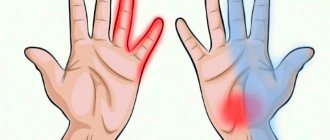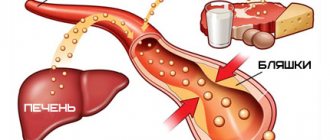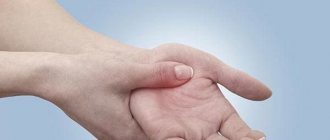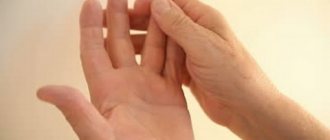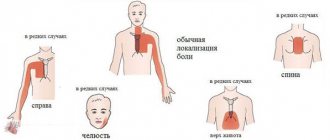Doctors Cost
Price list Doctors clinic
The feeling of numbness in the limbs is called paresthesia in medicine (from the Greek words “πᾰρά” - “outside, around, past” and “aisthesis” - “sensation”). This is the loss of normal tissue sensitivity due to impaired transmission of nerve impulses. It seems to a person that he is being touched through a layer of cotton wool.
Occurs at any age, often accompanied by tingling and goosebumps. It may be a physiological condition associated with prolonged compression of a nerve or blood vessels while in an uncomfortable position. When changing position, sensitivity is quickly restored. If the sensation is repeated, is not associated with an uncomfortable position, and lasts a long time, it requires diagnosis, as it may be a symptom of a dangerous disease.
Reasons for development
Various factors lead to impaired sensitivity, which can be divided into several large groups.
Table 1. Numbness of the extremities of the arms and legs: causes
| Cause | Examples of diseases, conditions |
| Squeezing blood vessels and nerve endings. | Intervertebral hernia, osteochondrosis, spondylosis, neoplasms. |
| Narrowing, blockage, deformation of veins. | Thrombophlebitis, varicose veins. |
| Cardiovascular diseases. | Cardiac ischemia. |
| Pathology of the nervous system. | Polyneuropathy, neuritis, radiculoneuritis, stroke. |
| Damage to blood vessels and nerves. | Injuries, postoperative complications. |
All paresthesias are fundamentally divided into two types.
- Transient. Caused by temporary compression of the neurovascular bundle – ischemia.
- Permanent. Occurs when there is anatomical damage to blood vessels or nerves.
If a person periodically experiences transient numbness, you should consult a neurologist for a thorough examination. This will help prevent life-threatening diseases: stroke, heart attack.
If an unpleasant sensation occurs and does not go away, you should also consult a doctor. Such problems do not disappear on their own. Without treatment, they can lead to disability.
Numb hands at night
Night hand numbness is typical for patients of any age. In the vast majority of clinical cases, its causes are degenerative-dystrophic changes in the cervical spine. Less commonly, such a pathological condition can be caused by heart disease, which cannot be left without medical attention.
The most common causes of numbness in the upper extremities at night include:
- incorrect neck position during work or night rest;
- long periods of time in front of the computer;
- the presence of osteochondrosis of the cervical spine;
- hernia or protrusion in the cervical spine (especially if we are talking about damage to the lower cervical vertebrae, in the spaces between which the nerves innervating the arms emerge;
- metabolic disorders in the body;
- tunnel syndrome or compressed nerve syndrome;
- diseases of the cardiovascular system;
- abuse of alcoholic beverages and nicotine;
- deficiency of B vitamins in the human body.
To get rid of night numbness of the hands, it is necessary to establish the true causes of this pathological condition. This will allow the doctor to understand the essence of the disorders and prescribe truly effective and correct therapy to the patient. It is important to understand that competent and timely diagnosis of the problem is the key to success on the path to solving it. Therefore, when the first signs of a painful condition develop, you should not waste precious time, but immediately contact a doctor who will help you get rid of the disorders.
Constant numbness in the extremities of the body
Carpal tunnel syndrome
The nerve fiber, located in a tight space limited by muscles and bones, is compressed by swollen tissues. Carpal tunnel syndrome is a common problem for modern people in certain professions: programmers, guitarists, artists, drummers - everyone whose work involves prolonged, monotonous stress on the hands. It manifests itself as paresthesia of the hand, pain, burning, sensation of electric shock, weakness, and inability to make some movements.
Radiculopathy
Compression of a nerve root by an intervertebral hernia. Numbness of an arm or leg depends on the level of compression and is accompanied by pain, muscle weakness, and impaired reflexes. At first it manifests itself as mild numbness of the extremities, gradually the symptoms increase. The pain decreases when lying down, but increases when the person stands, coughs or sneezes.
Metabolic polyneuropathy
It is characterized by a symmetrical lesion that develops due to a disturbance in metabolic processes in nerve fibers. It can be caused by diabetes mellitus, alcoholism, chronic renal failure, deficiency of vitamin B1, B12. Manifested by paresthesia, loss of sensation in the lower extremities, weakness, paresis.
Multiple sclerosis
Associated with the destruction of the myelin sheath (demyelination) of nerve fibers, which disrupts the conduction of nerve impulses. First, a transient sensation of numbness in the arms or legs appears, crawling along the fingertips, then the symptoms become more pronounced and permanent.
Polymyalgia rheumatica
Develops in people over 50 years of age. Accompanied by severe pain in symmetrical muscles, aggravated by movement, persisting at night. Most patients complain of muscle stiffness, numbness of the limbs in the morning and after prolonged immobility.
Factors of occupational hazard
Paresthesia is often caused by vibration and ultrasound. They damage peripheral nerves, cause loss of tactile sensitivity, numbness of the fingers, and intolerance to cold.
Numbness of the left hand
If your left hand is numb, you should always think about whether a person has heart disease, from mild forms of pathology to very complex and even deadly variants. What heart diseases can numbness in the left arm indicate? Pathological conditions that are accompanied by deterioration of sensitivity in the upper limb on the right include:
- high blood pressure of various origins;
- angina pectoris;
- myocardial infarction.
All these heart diseases require attention from a cardiologist, as they are fraught with consequences and can cause death in the patient.
If numbness of the left arm does not go away after changing body position, lasts more than one hour and is accompanied by pain in the area behind the sternum, then the patient should immediately seek qualified help.
Diagnostics
Clinical symptoms are of great importance for making a diagnosis. Therefore, the doctor carefully asks the patient about when the disease began, how it manifests itself, and what helps.
Table 2. Differential diagnosis of numbness and tingling in the extremities. Possible reasons
| Affected limbs | Localization, features of numbness | Presumable disease |
| Upper | Sudden lesion of one arm. | Intervertebral disc herniation, spondylosis, osteochondrosis, plexitis, tunnel syndrome |
| Combined with impaired active movements. | Polyneuropathy, plexitis, tunnel syndrome. | |
| Symmetry. | Intoxication, infection. | |
| Blueness of fingers. | Raynaud's disease. | |
| Affects all fingers except the little finger | Carpal tunnel syndrome. | |
| Paresthesia of the little finger | Ulnar nerve neuritis, ischemic heart disease | |
| Lower | The pathological process affects the legs and lower back. | Osteochondrosis, lumbar hernia, atherosclerosis, pinched sciatic nerve, cauda equina syndrome. |
| Combined with impaired active movements. | Arthritis, multiple sclerosis, carpal tunnel syndrome, polyneuropathy, stroke. | |
| Damage to the lower leg and foot in combination with pain and muscle tension. | Thrombophlebitis, neuropathy, varicose veins. | |
| Paresthesia of the toes. | Arthritis of the thumb, radiculoneuritis, neoplasm, polyneuropathy. | |
| Top and bottom | Numbness of the left or right limbs | There may be several reasons: stroke, brain tumor, multiple sclerosis, transient ischemic attack. |
When should you see a doctor?
In most cases, diseases that cause numbness are not life-threatening. However, some conditions require immediate consultation with a doctor, an accurate diagnosis and appropriate treatment.
It is urgent to see a specialist if numbness is accompanied by:
- limited mobility of fingers, arms or legs;
- sudden weakness, dizziness;
- urinary and fecal incontinence;
- speech disorders and impaired ability to move.
It is also unacceptable to postpone a visit to the doctor if numbness occurs after an injury in the back, neck or head.
Treatment
Table 3. Numbness of the extremities: causes and symptoms, treatment
| Cause | Symptoms, examples of pathologies | Treatment |
| Circulatory disorders | Ischemia, arterial hypertension, thromboembolism. | Treatment of the underlying disease. |
| Orthopedic problems | Disc herniation, osteochondrosis. | Conservative or surgical therapy to eliminate compression of the nerve roots. |
| Nerve compression | Tunnel syndrome, polyneuropathy. | Elimination of tissue edema, restoration of metabolic processes. |
How to identify the cause of numbness?
The treatment regimen for numbness depends entirely on the cause that caused it. To diagnose the likely culprits of numbness in a particular area, a neurologist may prescribe the following examination methods:
- MRI – used to diagnose osteochondrosis, intervertebral hernias, arthritis, etc.;
- X-ray examination - allows you to identify bone fractures that could cause nerve damage,
- duplex examination of blood vessels – reveals vascular diseases (atherosclerosis, thrombosis, varicose veins), congenital anomalies, post-traumatic changes;
- general blood analysis.
—>
At the MART clinic on Vasilyevsky Island
- Evidence-based medicine
- Experienced specialists
- Monitoring of patients for 6 months.
- Diagnostics (MRI, ultrasound, tests)
- Daily 8:00 – 22:00
Make an appointment
Treatment of numbness at the MART clinic
The reason for contacting the neurologists of the MART medical center is numbness in any area that occurs periodically without any apparent reason and lasts more than 1-5 minutes.
Doctors at our medical center, depending on the causes of numbness identified during the diagnosis process, can use manual therapy, physiotherapy, acupuncture, exercise therapy and other methods of conservative therapy to treat this condition. The course of treatment in each case is selected strictly individually.
By turning to the MART clinic for help in a timely manner, you can accurately determine the cause of the disturbing symptoms, quickly take appropriate measures and prevent the development of possible complications.
Sign up at the MART medical center in St. Petersburg (see map) by phone, or leave a request on the website.
If your hands are numb
Lately, more and more patients have been appearing in my office who are worried about one single symptom: at night they have to wake up several times due to numbness in their hands. The unpleasant sensations that accompany these phenomena are all described in a fairly similar way: a sharp awakening from pain in the hand, tingling, burning, “crawling” in combination with stiff fingers.
Usually people blame everything on the pillow (and change it more than once), the peculiarities of the posture during sleep (and they come up with various “limiters” so as not to turn on their side or on their stomach), “weak heart” (and they buy unnecessary medications in order to “ heal")...
In the end, exhausted, they come to a neurologist so that the doctor can find in their body what is interfering with proper rest and eliminate the inconvenience. And the doctor again walks in a vicious circle: pillow-pose-heart. And makes me do gymnastics. And he prescribes a bunch of studies that will take a lot of time. Couldn't it be faster? No you can not!
Where does such a misfortune come from?
If earlier such complaints were more often made by people whose professional activities were associated with sedentary work and straining their hands (computer operators, drivers, assembly line workers), now schoolchildren, students, and retirees also come. After all, computers have entered the lives of almost everyone. And almost everyone, starting from school, is faced with “computer mouse syndrome” (carpal tunnel syndrome), when mechanical compression of the nerves and blood vessels on the wrist regularly occurs, causing numbness in the fingers. Usually, wearing an orthosis and well-planned position of the keyboard and mouse quickly eliminate the problem, but with numbness at night, not everything is so simple.
Of course, most often the cause of numbness is quite banal - in 90% of cases it is compression of the neurovascular bundle along its entire length: from the spinal cord and aorta to the very tips of the fingers. But there are another 10% of cases when disruption of blood circulation and innervation occurs at a more subtle level - when the smallest vessels and nerve endings are damaged.
This ten percent includes diseases such as polyneuropathy and vasculitis. In order to exclude these pathologies, the doctor gives the night sufferer a long list of tests and examinations. These can be simple blood tests (general and biochemical), hormonal tests, electroneuromyography, duplex scanning of blood vessels, rheovasography, electrocardiogram, neuroimaging (x-ray of the neck, shoulder joints, CT and MRI). The doctor decides what to do and to what extent on an individual basis.
— Doctor, is it possible to do it somehow easier and faster?
Well, I’ll tell you what your “faster” usually looks like.
Stupid self-medication
And so we decided to save time and money on tests, because “we definitely feel that there is nothing serious,” and we enthusiastically take on treatment. On the Internet there are a lot of “folk” recommendations on the topic “how to deal with numbness in the hands”, and at the same time “how to get rid of back pain”. This includes sleeping with a potato in your hand, and massaging the joints of your hands and neck in various ways, and also making baths, compresses and rubbing in strong-smelling tinctures (probably to deter illness).
Does all this help? Yes and no. If one of the folk remedies, used in any form, accidentally affects the cause of the disease, then everything is great. But usually, for some reason, it is after somersaults with Internet advice that patients get worse. Maybe there are those who were cured once and for all by anointing parts of their bodies with turpentine, and no longer go to doctors? Alas, I doubt it...
Your own diagnostician
To figure out for yourself whether there is reason for concern or whether you are simply “tracking” your hands in your sleep (and then just change your position), here are a few simple tests.
Try raising your arms above your head and holding them for 30 seconds. Do you feel tingling? Going numb? Dress for the weather - and go to the neurologist. Do your joints hurt? Make an appointment with a rheumatologist. Place the blood pressure cuff on your arm below the elbow. Increase the pressure in the cuff to 130–140 mm Hg. If no unpleasant sensations appear within a minute, then there is no reason to worry. What if they appeared? And does your left hand go numb when you're nervous? Go ahead - to the cardiologist! Do both hands go numb at once when you're nervous? You may need to consult an endocrinologist. Well, what if there are none of the above symptoms? Then search again. Joke..
Tips to help
First, pay attention to sleep hygiene.
Do not smoke or drink alcohol before bedtime. Nicotine and ethyl alcohol promote short-term vasodilation. Their narrowing will be just in time for the sweetest dream and will provide you with an unforgettable night. Also, don't overeat. The body, which is busy digesting food, simply will not notice the catastrophe on the periphery, in the limbs. There is no need to fall into bed immediately after hard physical work or strength training. Any athlete and loader will tell you how, in this case, overworked muscles ache, spasm to the point of cramps, swell and hurt. And how gratefully they respond to relaxing water treatments and light massages! And less water before bed. Patients with diabetes and pregnant women are especially sensitive to this. Swelling of tissues disrupts metabolism in them and causes irritation of nerve endings. And then numbness and convulsions may occur...
Secondly, you should not sleep in one position all night.
Toss and turn! But at the same time, do not put your hands under your head, do not put them under the pillow. Try not to throw your arms and legs over your bedmate at night. If the fair half has the habit of falling asleep on the chest of a loved one, it is worth learning another habit - to crawl away no later than half an hour of being pressed down, no matter how brave the person being pressed is. For those who like to hug someone in their sleep, there are special C-shaped pillows. Try it - it's very convenient!
Thirdly, the pillow should be comfortable
so that your neck does not bend when lying on your side and does not arch when you lie on your back or stomach. By the way, not everyone likes orthopedic pillows. Many people prefer a “forming” pillow, which you want to roll out “into a pancake”, but you want to knock it into a ball. Plus a light blanket and comfortable, non-squeezing and non-restrictive clothing to help you sleep sweetly! But it’s better to remove jewelry - it’s better for both safety and health.
The population's excessive enthusiasm for mattresses that are too hard (“for back health”) is not at all useful and unnecessary. To experiment, let your pet choose soft or hard bedding - and animals know a lot about a good sleep! - and you will immediately understand what I mean.
Well, fourthly, move!
During the day, try to change your working position, twirl your arms, neck, bend and straighten. Do not hold the telephone receiver between your neck and shoulder, either at work or in the car (talking on the phone is also prohibited by traffic rules), or before going to bed, or in bed at night. Move - it revitalizes! If you carry heavy bags on your shoulders, buy those with the widest handles. If your breasts are larger than B, the bra should have straps +1–2 cm wide for each size. If your neck aches in the evenings, you can put on a Shants collar and walk around in it for 1 to 1.5 hours a day for 2 weeks. Massage also helps a lot.
Well, if all these tricks still don’t lead to the desired relief, make an appointment with a doctor. Helps. Verified.
Valentina Saratovskaya
Photo thinkstockphotos.com


